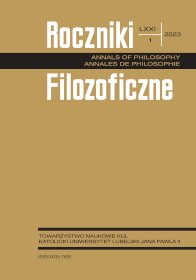REPUBLIKANIZM, USTRÓJ MIESZANY, KULTURA SPRZECIWU OBYWATELSKIEGO. WOKÓŁ ODCZYTANIA MYŚLI JEANA-JACQUES’A ROUSSEAU PRZEZ PHILIPA PETTITA
REPUBLICANISM, MIXED GOVERNMENT, CULTURE OF CONTESTATORY CITIZENRY: AROUND THE READING JEAN-JACQUES ROUSSEAU’S THOUGHT BY PHILIP PETTIT
Author(s): Rafał LisSubject(s): Cultural history, Governance, Political history, Social history, Government/Political systems, 18th Century
Published by: Towarzystwo Naukowe KUL & Katolicki Uniwersytet Lubelski Jana Pawła II
Keywords: republicanism; mixed government; popular sovereignty; citizenship; Rousseau;
Summary/Abstract: The article proposes a discussion with Philip Pettit’s theses developed in his book On the People’s Terms: A Republican Theory and Model of Democracy and his article “Two Republican Traditions.” Focusing on the so called Italian-Atlantic tradition, Pettit emphasises the linkeage of the ethos of contestatory citizenry and that of mixed constitution as crucial for republicanism. It is no coincidence that understing the tradition of republicanism in such a way, Pettit does not include Jean-Jacques Rousseau, seen rather as a forerunner of communitarism. Yet, one can hardly agree with Pettit’s classification of the republican tradition and — especially — with his reading of Rousseau. In the first place, it is precisely Rousseau’s thought that helps understand that republicanism, after all embodying the idea of citizens’ government, could absorb the values of mixed government only temporarly and conditionally — only until the latter could serve limitate non-civic (non-elective) elements of power. Pettit’s suggestion that the theory of popular sovereignty initiated by Rousseau must undermine the ideals of civic vigilance is also difficult to accept.
Journal: Roczniki Filozoficzne
- Issue Year: 71/2023
- Issue No: 1
- Page Range: 125-138
- Page Count: 13
- Language: Polish

